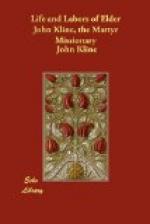SUNDAY, August 15. They all attended a meeting and love feast. John 15 was read. Five persons were baptized. The four brethren stayed all night at Brother Umbenhaver’s. On the twenty-third they dined at Brother Seacrist’s; then crossed the Juniata to Waynesboro and stayed all night at Brother Kensel’s. On the twenty-fourth they attended a love feast near Brother Samuel Myers’s. Hebrews 2 was read. One person baptized. On the twenty-fifth they went to Brother Dolyman’s. On the twenty-sixth they went through Lewistown; then down the canal to Mifflinburg, and on to Michael Basehore’s, where they had meeting. Acts 10 was read. From this place they went to David Myers’s, where they had night meeting. Mark 11 was read.
From some unknown cause, here is the first sermon outlined by Brother Kline in all this journey. He may have been too busy, at times, to give the outlines; and at other times may not have felt like doing it. There is so much originality of thought in the outlines that I here reproduce his discourse as nearly as possible.
Sermon by Elder John Kline.
Preached at David Myers’s, in Pennsylvania, August 26.
TEXT.—“By what authority doest thou these things?”
It was an exceedingly bold act on the part of our Lord to cleanse the temple at Jerusalem in the way he did it. In justification of his right to do this he appealed to what was written: “My house shall be called of all nations the house of prayer, but ye have made it a den of thieves.” But reference to this authority involved other questions of grave import in the minds of the scribes and Pharisees. They wished to doubt his right to appeal to this Scripture, because they were unwilling to concede his claim to the divine sonship. To raise as strong a breast of opposition against him as possible, there “come to him in the temple the chief priests, and the scribes, and the elders, and say to him, By what authority doest thou these things?”
Most unexpectedly to them, they were confronted by another question quite as direct, from whose point and power they quailed: “The baptism of John, was it from heaven, or of men?” Whilst many of the scribes and Pharisees and elders had never condescended to show John enough respect even to be present at any time when he was baptizing in the Jordan, still they knew, and felt most keenly, the power of his teachings and work upon the common people; for “all held John to be a prophet;” “but the Pharisees and lawyers rejected the counsel of God against themselves, being not baptized of him,” John.
To all human appearance, the influence of the baptism and teachings of John, upon the common people, saved our Lord’s life upon this and probably other occasions, for the scribes and chief priests sought opportunity to destroy him; but they feared the common people. In this we discover traces of the good accomplished by John’s mission, which was “to make ready a people prepared for the Lord;” and this people was the common people.




